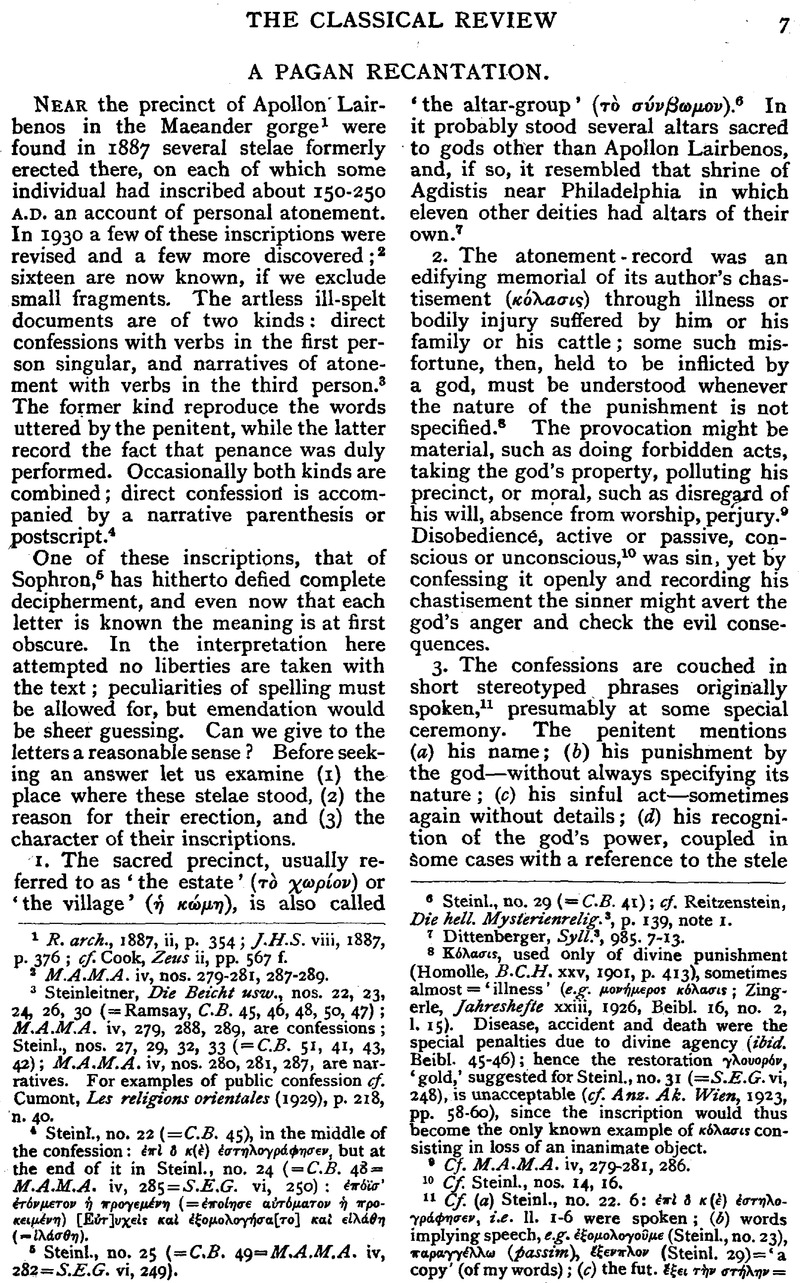No CrossRef data available.
Published online by Cambridge University Press: 27 October 2009

page 7 note 1 R. arch., 1887, ii, p. 354; J.H.S. viii, 1887, p. 376; cf. Cook, Zeus ii, pp. 567 f.
page 7 note 2 .M.A.M.A. iv, nos. 279–281, 287–289.
page 7 note 3 Steinleitner, Die Beicht usw., nos. 22, 23, 24, 26, 30 (=Ramsay, C.B. 45, 46, 48, 50. 47): M.A.M.A. iv, 279, 288, 289, are confessions; Steinl., nos. 27, 29. 32. 33 (= C.B. 51, 41. 43. 42); M.A.M.A. iv, nos. 280, 281, 287, are narratives. For examples of public confession cf. Cumont, Les religions orientates (1929), p. 218, n. 40.
page 7 note 4 Steinl;., no. 22 (=C.B. 45), in the middle of the confession: ![]() , but the end of it in Steinl., no. 24 ( = C.B. 4δ = M.A.M.A. iv, 285 = S.E.G. vi, 250):
, but the end of it in Steinl., no. 24 ( = C.B. 4δ = M.A.M.A. iv, 285 = S.E.G. vi, 250): ![]() .
.
page 7 note 5 Steinl., no. 25 (= C.B. 49 =M.A.M.A. iv, 282 =S.E.G. vi, 249).
page 7 note 6 Steinl., no. 29 (= C.B. 41); cf. Reitzenstein, Die hell. Mysierienrelig 3., p. 139, note I.
page 7 note 7 Dittenberger, Syll.3, 985. 7–13.
page 7 note 8 Κλαις, used only of divine punishment (Homolle, , B.C.H. xxv, 1901, p. 413)Google Scholar, sometimes almost = ‘illness’ (e.g. μονμερος κλαδις; Zingerle, , Jahreshefte xxiii, 1926, Beibl. 16, no. 2, 1. 15)Google Scholar. Disease, accident and death were the special penalties due to divine agency (ibid. Beibl. 45–46); hence the restoration γλουορν, ‘gold,’ suggested for Steinl., no. 31 (= S.E.G. vi, 248), is unacceptable (cf. Anz. Ak. Wien, 1923, pp. 58–60), since the inscription would thus become the only known example of κλασις consisting in loss of an inanimate object.
page 7 note 9 Cf. M.A.M.A. iv, 279–281, 286.
page 7 note 10 Cf. Steinl., nos. 14, 16.
page 7 note 11 Cf. (a) Steinl., no. 22. 6: ![]() , i.e. 1–6 were spoken; (b) words implying speech, e.g.
, i.e. 1–6 were spoken; (b) words implying speech, e.g. ![]() (Steinl., no. 23), παραγγλλω (passim), ἔξενπλον (Steinl. 29) = ‘ a copy ’ (of my words); (c) the fut.
(Steinl., no. 23), παραγγλλω (passim), ἔξενπλον (Steinl. 29) = ‘ a copy ’ (of my words); (c) the fut. ![]() = he shall have the stele’ (when it is erected), since at thetime of speaking there is none. (d) Zingerle's emendation, (π)ῄκω (Steinl. 22; cf. S.J.S.G. vi, 252) = φῄκω, suits well in an oral confession.
= he shall have the stele’ (when it is erected), since at thetime of speaking there is none. (d) Zingerle's emendation, (π)ῄκω (Steinl. 22; cf. S.J.S.G. vi, 252) = φῄκω, suits well in an oral confession.
page 8 note 1 Steinl., nos. 22, 23, 29, 30; M.A.M.A. iv, 279.
page 8 note 2 The status and functions of hieroi and kierai are still unknown; cf. Robert, B.C.H. lii, 1928, p. 419, note3; R. de Phil., 1929, p. 133, note 6.
page 8 note 3 ‘ Te ’ may be a variant of Ta, but the frequency of confusion between Γ and T makes it probable that this is the common name Γ.
page 8 note 4 For ὑποδτρφεδθαι, meaning ‘ to change one's faith,’ ‘ to be converted,’ cf. P. Cair. 67004. 9(6th C.): ![]() . The active ὑποδτρφειν thus seems to be a technical term meaning ‘ to convert ’ or ‘to pervert ’; the latter must be the sense here. N final is dropped, as in Ἀπλλω(ν) above, and in παρμη(ν) εἰς τἠνκώμη(ν) Steinl., no. 24 = M.A.M.A. iv, 285 = S.E.G. vi, 250.
. The active ὑποδτρφειν thus seems to be a technical term meaning ‘ to convert ’ or ‘to pervert ’; the latter must be the sense here. N final is dropped, as in Ἀπλλω(ν) above, and in παρμη(ν) εἰς τἠνκώμη(ν) Steinl., no. 24 = M.A.M.A. iv, 285 = S.E.G. vi, 250.
page 8 note 5 Here also N final is missing, perhaps owing to haplography. In P. Berl. 1141. 45 (2nd C): ![]() , the verb means ‘to oppose,’ and in P. Oxy. 1380. 221:
, the verb means ‘to oppose,’ and in P. Oxy. 1380. 221: ![]() , it seems to be as here a religious technical term; see note 8 below.
, it seems to be as here a religious technical term; see note 8 below.
page 8 note 6 The Nymphs were worshipped as healers; cf. Sardis vii, I, no. 94.
page 8 note 7 On the penalties for transgression see Dittenberger, Syll.3, 985. 45–49.
page 8 note 8 These confessions, like the devotiones, abound in ‘orthograpbe incorrecte, syntaxe irrégulière, mots nouveaux ’ (Homolle, , B.C.H. xxv, 1901, p. 413)Google Scholar, and many such new words have technical meanings; cf. Steinl., pp. 100 f.; Zingerle, , Jahresh. xxiii, 1926, Beibl. 15 fGoogle Scholar. Just as δυνδταδθαι is fast technisch’ equivalent to μιλεῖν θε (Reitzenstein, op. cit., p. 35, note I), so ὑφστασθαι may in Phrygia technically have meant ‘ to show disloyalty ’ to the gods.